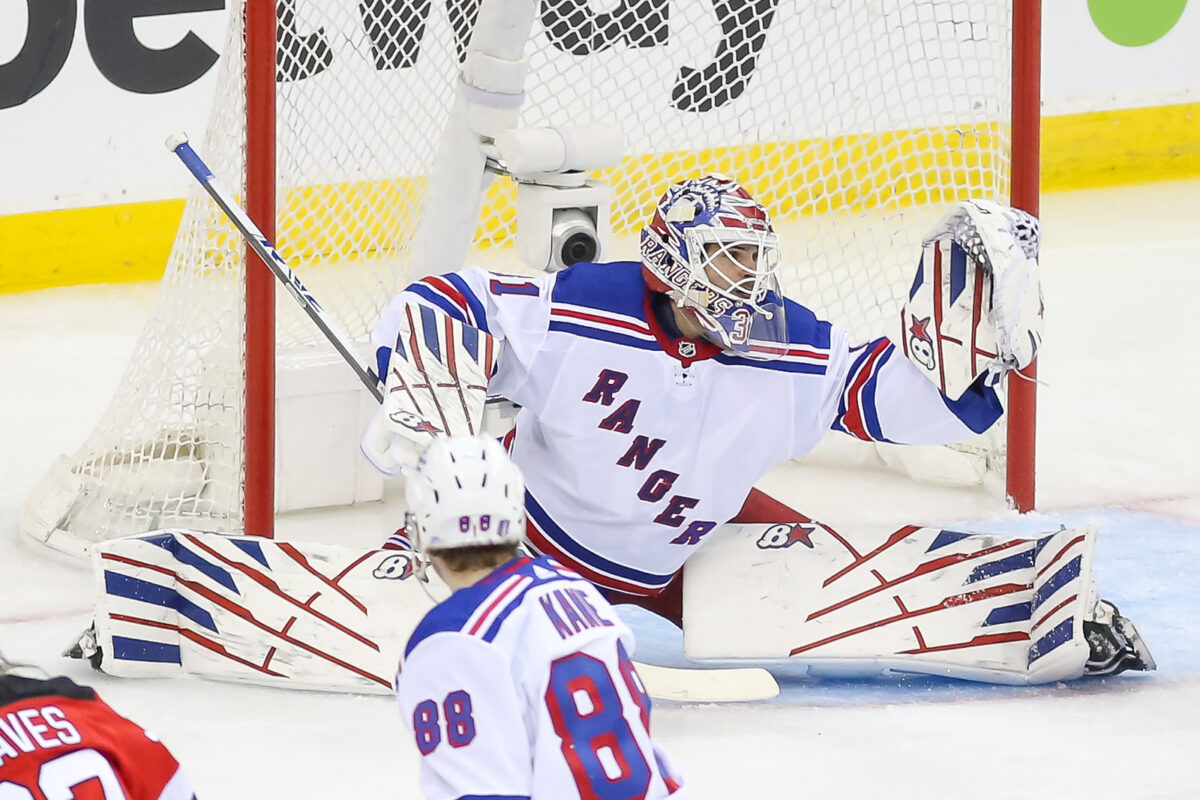Last night, the New York Rangers bested the Columbus Blue Jackets in a defensive battle that reached a shootout after a scoreless game. The shootout went three rounds, with Vincent Trocheck scoring the only goal. Igor Shesterkin willed the Rangers to a 1-0 win, moving them just three points out of a playoff spot.
Related: Rangers’ Will Borgen Providing Steady Defensive Play
In a game defined by strong defensive play, big saves, and multiple shots off the post, neither team found the net for 65 minutes. The Blue Jackets came up empty on two power plays, while the Rangers failed to capitalize on their own. In overtime, the teams traded chances, but the two best opportunities came on separate breakaways for Mika Zibanejad. He was unable to convert either one.

Artemi Panarin shot first in the shootout and had Blue Jackets netminder Daniil Tarasov beat, but he hit the post. Columbus’s first shooter, Kent Johnson, was denied by Shesterkin. Trocheck then put the Rangers ahead with a low shot to Tarasov’s blocker side. Shesterkin stopped Adam Fantilli, Zibanejad missed on his attempt, and finally, Shesterkin denied Kirill Marchenko to secure a much-needed two points for the Rangers.
Rangers Takeaways
- Zibanejad had one of his better games of the season. Many fans and members of the media have been tough on Zibanejad this season, myself included, but he has improved as of late. His play is still not where his $8.5 million contract suggests it should be. Zibanejad’s most noticeable shift came when he was clearly frustrated. After he felt there was a missed call and had taken two penalties, both of which he and his teammates felt were soft, Zibanejad skated the puck into the offensive zone, made a move around a defenseman, and then attempted the Michigan. While his attempt failed, it showed a confidence that Zibanejad had not displayed in a long time. Maybe the answer to Zibanejad’s struggles is to get him angry. While there are still clear issues with his game, he has undeniably taken at least a few steps forward recently.
- Shesterkin starred with 27 saves on 27 shots in regulation and overtime, followed by stopping all three shootout attempts against him. Shesterkin will always be the backbone of the Rangers—they will go as far as he takes them, and they need him to play like he did last night. According to MoneyPuck.com, he stopped 2.67 goals above expected. This is the version of Shesterkin the Rangers will need going forward.
- Will Borgen, acquired by the Rangers when they traded Kaapo Kakko to the Seattle Kraken, has slid into his top-four role next to K’Andre Miller, and it has fit like a glove so far. One play that stood out was when Borgen faced a 2-on-1 and made a sliding poke check to prevent a scoring opportunity. Borgen has been a good addition so far, and while he has not lit up the scoresheet, his consistency on defense is incredibly valuable to a team that has struggled defensively this season.
- With the March 7 trade deadline approaching, the Rangers face a decision: to buy or to sell—that is the question. If the team that has surged into 2025 continues its strong play, currently 6-1-2 since Jan. 1, then the answer must be to use their $22,949,421 in projected cap space to make additions. However, if they falter, they must shift their focus to recouping assets, whether in the form of draft picks or prospects. After three consecutive seasons of trading away assets for rental players at the deadline, the Rangers must tread carefully. This cannot be another season of reckless spending, especially with the very real possibility of missing the playoffs.
- Finally, while not relevant to last night’s game, it has become clear that the Rangers have a developmental and usage problem. After five and a half seasons with the Rangers, Kakko, a 2019 second-overall pick, was traded to the Kraken in a package that included Borgen. While Borgen has been solid for the Rangers, what Kakko has done in Seattle should be concerning to the Rangers organization as a whole. Since arriving, Kakko has put up 13 points (four goals and nine assists) in 14 games for the Kraken. That represents a 76-point pace when extrapolated over a full 82-game season. While it is possible that his scoring pace slows, Kakko never posted numbers like that in New York. The Rangers need to reevaluate how they develop prospects and utilize young players, or they will see more draft busts in the years to come. If Kakko turns out to be a point-per-game player in the NHL, the Rangers’ brass will have many questions that need to be answered.
